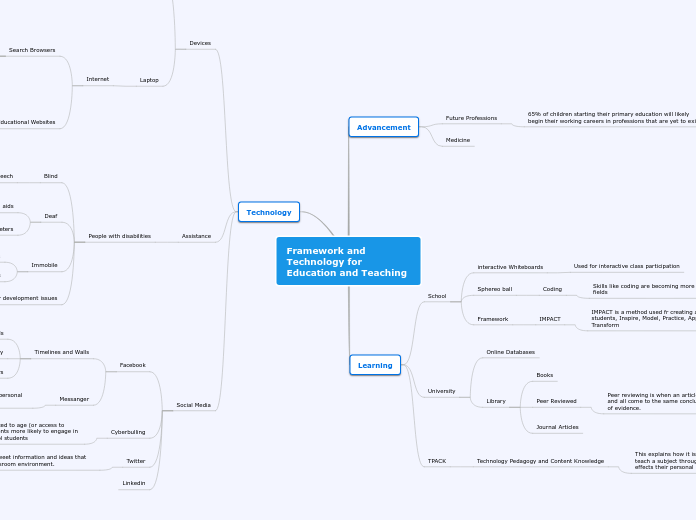Framework and Technology for Education and Teaching
Advancement
Future Professions
65% of children starting their primary education will likely begin their working careers in professions that are yet to exist.
Medicine
Learning
School
interactive Whiteboards
Used for interactive class participation
Sphereo ball
Coding
Skills like coding are becoming more sort after in different fields
Framework
IMPACT
IMPACT is a method used fr creating assessment or tasks for students, Inspire, Model, Practice, Apply, Connect and Transform
University
Online Databases
Library
Books
Peer Reviewed
Peer reviewing is when an article is overlooked by many peers and all come to the same conclusion making it a critical piece of evidence.
Journal Articles
TPACK
Technology Pedagogy and Content Knowledge
This explains how it is important for teachers to effectively teach a subject through the use of technology and how it effects their personal pedagogy.
Technology
Devices
Mobiles
Photo and video
Applications
Dojo
Application used to communicate with parents and students
Seesaw
Marking tool used by teacher to track student results
Laptop
Internet
Search Browsers
Safari
Firefox
Youtube
View tutorials and other means of learning in video format.
Educational Websites
Mathletics
Online site that allows students to practice their mathematics skills in a competitive social environment.
Reading Eggs
Online site that allows students to practice their reading, writing and spelling
Assistance
People with disabilities
Blind
Text to speech
Allows those who are blind or have visual impairments to send messages or type by speaking into their device
Deaf
Hearing aids
Loop systems in schools that feed information from the teacher to a student with hearing difficulties.
Interpreters
Immobile
Motorised wheelchairs
Lifts
Fine and gross motor development issues
Social Media
Timelines and Walls
Friends
Family
Others
Messanger
Directly message colleagues or loved ones for more personal matters.
Cyberbulling
Online bullying appears to be related to age (or access to technology), with secondary students more likely to engage in bullying online than primary school students
Allows users to post and retweet information and ideas that could pose useful in the classroom environment.
